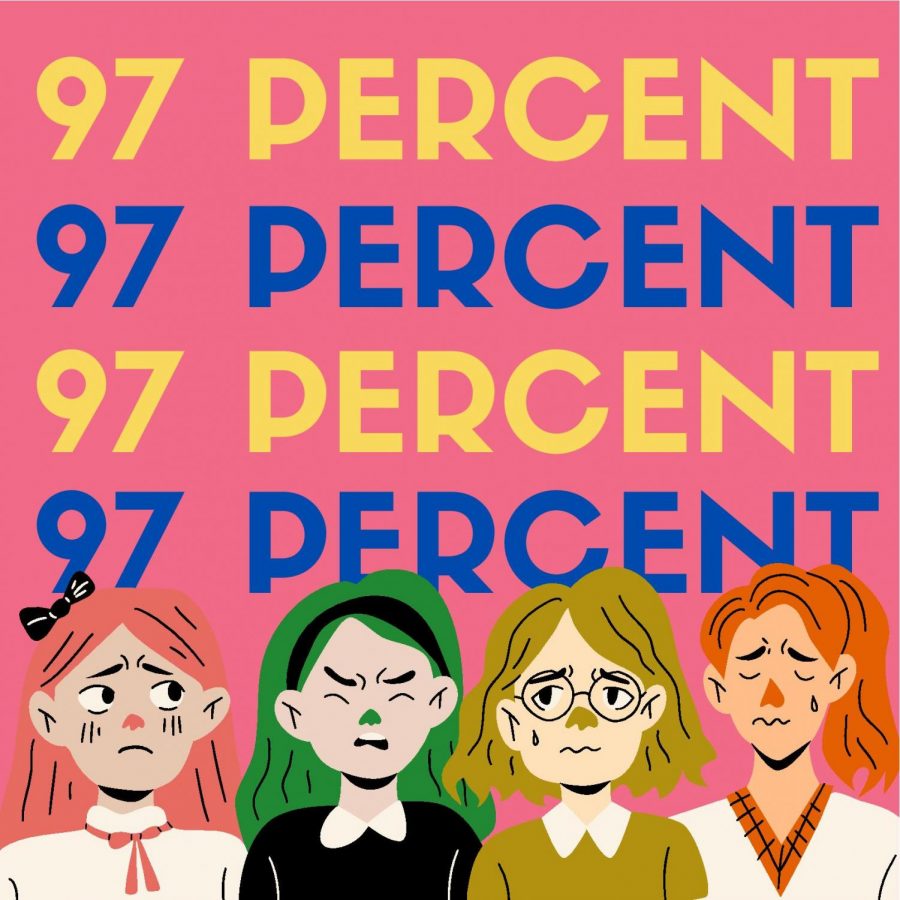97 Percent: When is Enough, Enough?
April 21, 2021
Just last week, senior Aliya Govindraj was shopping in a local grocery store when she noticed an older man trailing close behind, following her through the aisles. He approached her and started talking to her, despite her visible discomfort. She fended him off without problem, but not all women are as lucky.
“I have friends who have experienced the more extreme end of things, like almost being sexually trafficked or even being assaulted,” said Govindraj, who has been vocal about sexual harassment on social media. “While most people I know haven’t gone through that, we’ve all been followed, cat-called and had inappropriate comments made about our bodies.”
For many women, sexual harassment is an ever-looming threat, something to constantly be alert to and always prepared for.
“What most men don’t seem to understand is that sexual harassment isn’t this one instance that happens to us every once in a while,” she said. “It impacts every single aspect of our lives.”
Based on newly released statistics, Govindraj’s experience is not unusual. The United Nations Entity for Gender Equality and the Empowerment of Women (UN Women) published a study last month reporting that 97 percent of women aged 18 to 24 in the United Kingdom have experienced sexual harassment in some form.
UN Women defined sexual harassment as “unwelcome sexual conduct,” but acknowledged that a universal definition for sexual harassment doesn’t exist. The organization said that most definitions refer to the subjective experience of the individual, where they were made to feel unsafe, humiliated or intimidated.
In the wake of the #MeToo movement, the study went viral across social media platforms and a wave of Pali students became involved in the conversation about the statistic and its significance.
“I’m really glad that a comprehensive study on sexual harassment has finally been conducted because I feel like a lot of the time sexual assault is really the only aspect of harassment that we have statistics on,” Govindraj said. “It’s really limiting in that so many women, despite not being assaulted per se, have been negatively affected by rape culture in some way.”
Also joining in on the dialogue was senior Jairo Villegas, who experienced backlash on Instagram after clarifying what he considered to be misconceptions about the study.
“People were using the 97 percent harassment statistic [to say that] 97 percent of men were the aggressors,” Villegas said. “They were flip-flopping the statistic, and that’s not cool.”
Villegas expressed frustration that as the statistic spread, misinformation villainizing large numbers of men spread as well.
“People are just making statements without stating a source, they’re just throwing numbers up,” he said. “That’s the problem… People need to do their homework.”
Villegas said he considers sexual harassment to be more than just a women’s issue. Mirroring his view, a 2017 CNBC poll found that 10 percent of men reported being victims of sexual harassment or sexual misconduct at work. In fact, the Washington Post reported in 2018 that men account for nearly 1 in 5 complaints of workplace sexual harassment.
“Sexual harassment is a problem in general. Not just women are harassed. I have been groped and a lot of my homies have also been sexually violated,” Villegas said. “Under the qualifications of what this study was considering harassment, I’m sure 97 percent of the people on the planet have experienced harassment in that way.”
Some students have sprung into action to address the issue, trying to initiate productive change in the Pali community.
Sophomore Shaya Keyvanfar became a certified peer educator last August with SafeBAE, a student-led organization seeking to end sexual assault among teens with peer-to-peer education and guidance.
Keyvanfar shares informational presentations at monthly club meetings, open to all Pali students, about how to shift school culture by raising awareness about sexual violence. She credits the UN Women study with increasing engagement at her meetings.
“Sexual violence has become so widespread and trivialized,” Keyanfar said. “It wasn’t a popular topic before, but ever since people started to learn about the statistic that 97 percent of women that are affected by sexual violence… it made people have an urge to come [to the meetings].”
As the buzz surrounding the 97 percent statistic inevitably fades, Keyanfar hopes to keep the conversation about sexual harassment alive and encourages others to do the same.
“There are so many clubs on campus that deal with issues like sexual harassment,” she said. “It is important to familiarize ourselves with these topics and internalize what you can do.”
The Gender Equity Alliance and Sexual Harassment and Rape Education club are among those tackling these issues.
Govindraj hopes that the fight against sexual harassment will extend beyond social media posts and Instagram comment section debates.
“Social media is just the bare minimum,” she said. More important than women sharing horror stories, Govindraj said, will be men holding each other accountable.
“Men especially should be having these conversations with male friends and not being afraid to call those close to them out on what they are doing to women,” Govindraj advised. “This is a massive societal change that likely won’t change monumentally in our lifetimes, unfortunately, but slow progress is still progress.”
—————————————————————————————————————————
Under Title IX, schools are required to protect sexual violence survivors from their perpetrators on campus. Survivors can reach out to Campus Director Gio Stewart, Assistant Principal Dean Howard or Director of Academic Achievement Monica Iannessa to report their assaults.
If you, or someone you know, have been sexually harassed or assaulted, you can call the Teen Line confidential hotline, (310) 855-4673, or the California toll-free line, (800) 852-8336, anytime between 6 p.m. and 10 p.m. Pacific Standard Time for aid.
To talk with a specially trained teenager, text “TEEN” to 839863. To access the Teen Line message board, go to teenlineonline.org/board. To access the Rape, Abuse and Incest National Network (RAINN), go to https://www.rainn.org/ for a 24/7 online chat and free hotline.
For information about personal safety within relationships and for a live chat window, go to www.loveisrespect.org or text “LOVEIS” to 22522 to reach a support agent.












